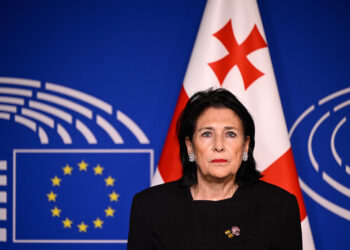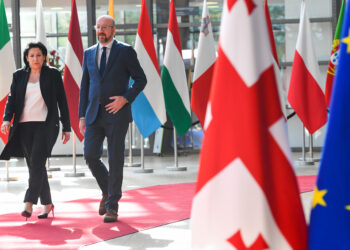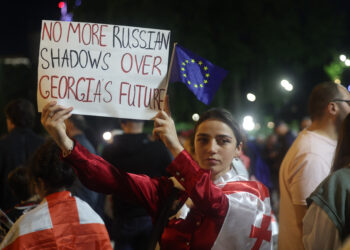Brussels – It is no longer just “de facto,” now the suspension of Georgia’s EU accession process is a reality with the first funds to the government in Tbilisi frozen. “EU has frozen its support for Georgia from the European Peace Facility – EURO 30 million for 2024,” said the EU ambassador to Georgia, Paweł Herczyński, speaking to the press today (July 9) in the Caucasian country’s capital, anticipating that “this is just the first step, there will be others” and in Brussels, “other measures are being considered if the situation further deteriorates.”
What led to the cut in funding for the Georgian armed forces was the mid-May adoption of the pro-Russian law on ‘transparency of foreign influence’ that – as the European Council said in its conclusions on June 27 – “has effectively brought the accession process to a halt,” despite the candidate country status received on December 14, 2023, from the European Council. “We are taking short-term measures, and we are reviewing our financial assistance,” European External Action Service (EEAS) spokesman Peter Stano told Eunews, referring to the June 24 talks of the External Affairs Council on the “different options to address the situation in Georgia.”

In any case, “we will reduce our direct aid to the Georgian government, and we will try to shift it to civil society and the media,” Ambassador Herczyński wanted to clear the field of doubts, keeping clear the distinction for the EU between the pro-Russian Georgian Dream ruling party and the strongly pro-European civil society. It is a clear distinction ahead of the legislative elections scheduled for October 26. “It’s up to the people to elect the next government, and it’s up to the next government to decide its policy towards the European Union,” the EU ambassador said, putting the options on the table: “They have to decide if they want to be part of the next big EU enlargement or if they have other plans for their future.”
With elections just over three months away, the opposition parties to Georgian Dream are organizing a common platform that takes its lead from the ‘Georgian Charter’ that the President of the Republic, Salomé Zourabichvili, presented in late May. Several political formations have already confirmed that they are running under the same political umbrella (with common or different, but still allied candidates) with the explicit goal of “restoring the EU accession process and opening accession negotiations as soon as possible.” According to Ambassador Herczyński’s warning, “Everything can still change, and we are more than willing to help in any way we can, but time is running out,” and it is “sad to see relations between the EU and Georgia at such a low point when they could have reached an all-time high.”
The Foreign Agents Law in Georgia
The Georgian Dream party submitted the law on ‘transparency of foreign influence’ last year, but it stalled after mass protests in March 2023. . With a slight amendment to the text in early April, the government resubmitted the law: All organizations receiving more than 20 percent of their funding from abroad would have to register as an ‘organization pursuing the interests of a foreign power’ (similar to ‘agent of foreign influence’ in effect in Russia since December 1, 2022). After weeks of extremely high tension inside and outside the Tbilisi Parliament, with tens of thousands of citizens triggering the largest wave of protests since independence from the Soviet Union in 1991 – every day continuously for two months – the ruling party decided to proceed with its legislative initiative before returning to the polls on October 26, showing a willingness to increase the scale of violence deployed by riot police and balaclava-wearing officers against tens of thousands of peaceful pro-EU protesters, who never stopped taking to the streets every day.
After the first passing of the law (according to the ordinary legislative process) on May 14, a new very rapid legislative process began to overcome the decision of the head of state, who always strongly opposed a law that disturbingly repeats many elements of the same regulation in force in Russia. President Zourabichvili’s move was purely symbolic since the government knew at the outset that it could use its overwhelming majority in Parliament to override the veto and make ‘foreign influence transparency’ become law, as confirmed on May 28 at the plenary session of Parliament.
Before the Foreign Agents Act
Despite being granted candidate status for EU membership, the relationship between Brussels and Tbilisi remains particularly complex – and now very tense – because of the divergence between an overwhelmingly pro-EU population and a government of pro-Russian tendencies, the same one that applied to join the Union over fears raised by the Kremlin’s expansionism. Over the past two years, there have been several episodes that have highlighted the ambiguity of the ruling Georgian Dream party: in May 2023 flights between Georgia and Russia resumed after Moscow decided to lift the current ban, and the Caucasian country never aligned with the restrictive measures introduced by Brussels against the Kremlin after it invaded Ukraine. Last fall the government also attempted (but failed) to impeach the President of the Republic, Zourabichvili, for a series of trips to the European Union that allegedly constituted a violation of the powers of the state head of state under the national Constitution.

But the Georgian population has for years shown that it does not share the direction taken by Georgian Dream, and this is one reason why the October 26 elections to renew parliament will be crucial. Between the decision by Brussels in June 2022 not to grant Georgia candidate status for the time being, two major pro-EU demonstrations took place in Tbilisi: the March for Europe to reiterate the people’s alignment with the values of the Union and a public square calling for the government’s resignation (with no follow-up by the then Garibashvili-led executive). These demonstrations had in common the flags – white and red of the five crosses (national) and with the twelve stars on a blue field (of the EU)- with pro-European claims and the Georgian anthem interspersed with the Ode to Joy. A year later, harsh mass protests broke out in March 2023 – supported by Brussels – which led to the momentary shelving of the controversial bill on transparency of foreign influence before passing this spring amid a new wave of mass protests.
In this scenario, one should not forget Georgia’s sensitive relationship with Russia, a country with which it borders to the north. Its EU and NATO membership candidacy – enshrined in its national constitution – has long been a cause of tension with the Kremlin. After conflicts in the 1990s with the two separatist regions of South Ossetia (1991-1992) and Abkhazia (1991-1993) following Georgia’s 1991 independence from the Soviet Union, the situation was effectively frozen for 15 years, with troops of the newly formed Russian Federation defending the secessionists within the claimed territory. The attempt to reassert Tbilisi’s control over the two regions in the summer of 2008 – that former President Mikheil Saakashvili wanted -led to a violent Russian reaction on August 7, not only in repelling the Georgian army’s offensive but also leading to the invasion of the rest of the national territory with tanks and air raids for five days. Since then, Vladimir Putin‘s Russia has recognized the independence of Abkhazia and South Ossetia and has deployed thousands of soldiers to the two territories to increase its sphere of influence in the Ciscaucasia region, in violation of the August 12, 2008 agreements.
English version by the Translation Service of Withub








![La riunione informale del consiglio Competitività [Budapest, 9 luglio 2024. Foto: European Commission]](https://www.eunews.it/wp-content/uploads/2024/07/compet-hu-75x75.png)


![Una donna controlla le informazioni sul cibo specificate sulla confezione [foto: archivio]](https://www.eunews.it/wp-content/uploads/2014/12/Etichette-alimentari.jpg)

